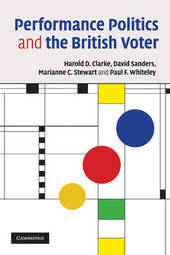
|
Performance Politics and the British Voter
Paperback / softback
Main Details
| Title |
Performance Politics and the British Voter
|
| Authors and Contributors |
By (author) Harold D. Clarke
|
|
By (author) David Sanders
|
|
By (author) Marianne C. Stewart
|
|
By (author) Paul F. Whiteley
|
| Physical Properties |
| Format:Paperback / softback | | Pages:388 | | Dimensions(mm): Height 228,Width 153 |
|
| ISBN/Barcode |
9780521697286
|
| Classifications | Dewey:324.941 324.941 |
|---|
| Audience | | Professional & Vocational | |
|---|
| Illustrations |
53 Tables, unspecified
|
|
Publishing Details |
| Publisher |
Cambridge University Press
|
| Imprint |
Cambridge University Press
|
| Publication Date |
23 July 2009 |
| Publication Country |
United Kingdom
|
Description
What matters most to voters when they choose their leaders? This book suggests that performance politics is at the heart of contemporary democracy, with voters forming judgments about how well competing parties and leaders perform on important issues. Given the high stakes and uncertainty involved, voters rely heavily on partisan cues and party leader images as guides to electoral choice. However, the authors argue that the issue agenda of British politics has changed markedly in recent years. A cluster of concerns about crime, immigration and terrorism now mix with perennial economic and public service issues. Since voters and parties often share the same positions on these issues, political competition focuses on who can do the best job. This book shows that a model emphasizing flexible partisan attachments, party leader images and judgments of party competence on key issues can explain electoral choice in contemporary Britain.
Author Biography
Harold D. Clarke is Ashbel Smith Professor in the School of Economic, Political and Policy Sciences at the University of Texas at Dallas. David Sanders is Professor of Government at the University of Essex. Marianne C. Stewart is Professor of Political Science in the School of Economic, Political and Policy Sciences at the University of Texas at Dallas. Paul F. Whiteley is Professor of Government at the University of Essex.
Reviews'Choice based models of political behaviour take centre stage in this book where the analysis of the 2005 election is embedded into a rich discussion of political attitudes and preferences of the British public. The authors develop, test and demonstrate how 'valence politics' theory significantly contributes to explaining turnout, party choice and civic involvement in the UK and abroad. The reader will enjoy a masterly blend of analytical theorising and rigorous empirical testing which shows how advanced modelling sheds light on controversial issues. A rewarding read for scholars of UK and comparative political behaviour.' Paolo Bellucci, Italian National Election Study, University of Siena 'An engaging account of how British voters manage to make intelligent choices in general elections, told convincingly from the vantage point of 'valence politics,' with special attention to the wrenching issue of war and peace in the 2005 election. Buttressed by meticulous analysis and mindful of alternative explanations, this book will appeal to any student of voting, far beyond the realm of British politics, whether in political science, sociology, psychology, or mass communications.' Helmut Norpoth, Stony Brook University 'An outstanding example of theoretically-led and empirically sophisticated social science, Performance Politics and the British Voter puts political choices squarely back at the centre of electoral studies through (inter alia) its analyses of valence politics, campaigning, participation and support for the political system. The book makes a significant and lasting contribution to our understanding of contemporary electoral politics and will be a must-read contribution for all scholars in the field.' Charles Pattie, Department of Geography, University of Sheffield 'Clarke, Sanders, Stewart, and Whiteley have once again raised the standard for the scientific study of national elections. Performance Politics and the British Voter provides a comprehensive examination of the specifics of the 2005 British parliamentary elections, as well as the broader picture of how that election fits into modern British politics. The authors develop scientific tests that pit rival theories of political behavior against each other, resulting in a knockout win for the valence theory of politics. This allows them to make strong inferences that travel well beyond Britain and 2005. Anyone who is serious about understanding how voters make up their minds needs to read this book.' Guy D. Whitten, Texas A&M University and co-author of The Fundamentals of Political Science Research (Cambridge
|